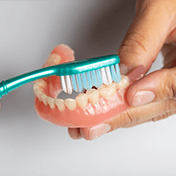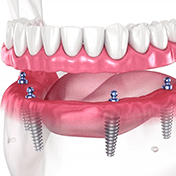Dentures – Ocala, FL
If you’ve experienced significant tooth loss in the upper or lower arch, dentures in Ocala are an effective solution to rebuild a functional smile. Dr. Daniel Weldon is highly qualified to evaluate any remaining teeth, your gums, and bone to provide a denture that closely looks and feels realistic. He’ll determine which prosthetic will best meet your needs and expectations to restore a beautiful, complete smile.
Who's a Good Candidate for Dentures?

Dentures are a very well-known solution for missing teeth, but are they really the best choice for you? Our team can help you answer that question if you set up a consultation at our office. Generally speaking, most people with missing teeth can benefit from dentures, whether they’ve just lost one tooth or all of them. In some cases, you may need a few preliminary treatments to improve the health of your gum line and jawbone before you can get dentures.
Effects of Missing Teeth

Once your permanent teeth erupt, they’re supposed to stay in your mouth for the rest of your life. Sadly, tooth loss can occur more easily than you might realize. Gum disease can damage the tissue holding your teeth in place until they come loose or fall out. Untreated tooth decay could grow severe enough that an extraction is the only option. A strong impact to the mouth could end up knocking out one or multiple teeth.
The effects of tooth loss are generally the same no matter what the cause is. Your body will start to resorb your jawbone due to the lack of stimulation. This weakens your jaw overall and could cause you to lose more teeth. Also, you might have trouble maintaining a healthy diet since it will be more difficult to eat certain foods, and it may be harder for you to speak in a way that’s easy to understand.
In short, you don’t want to face life with missing teeth for too long. We recommend calling our office right away so that you can take the first step in discovering whether dentures are right for you.
What Qualifies You for Dentures?

We may recommend dentures for anyone who has extensive tooth loss. They can also be a good choice if you have multiple decayed teeth or extensive tooth sensitivity. We will need to make sure that you have a sufficiently strong jawbone as well as healthy gum tissue before we confirm that dentures are right for you.
You can qualify for different kinds of dentures depending on your situation. Complete dentures, partial dentures, and implant-retained dentures may all be considered. When we recommend a type of denture, we’ll make sure that you’re fully aware of the costs associated with it.
Alternative Tooth-Replacement Options

Dentures are not the only kind of tooth replacement option we offer. Here are a couple of alternatives you can consider if dentures aren’t the best fit for you:
- Dental Bridges: A dental bridge is often the best choice if you have only lost one tooth or a few missing teeth in a row. This type of restoration can only be placed if the teeth next to the gap are healthy enough to give the bridge the support it needs.
- Dental Implants: Dental implants can be thought of as artificial tooth roots that can give a crown, bridge, or denture extra strength and stability. The implant posts will have to be surgically inserted into your jaw, so they’re only a viable option if you have sufficient bone density.
How Dentures Are Made

Due to their versatility, dentures can be specifically designed to fit every patient’s smile. But what exactly does the process involve in making them? By knowing how they’re constructed, along with the materials used, you might have another reason to appreciate the prosthetics that are built to effectively renew your beautiful smile. Keep reading to learn how these natural-looking prosthetics are made and tips for getting accustomed to them.
What Are Dentures Made Of?

Dentures are generally made up of two components: the base and the artificial pearly whites. Here’s what to expect from them:
- Denture base – This structure provides the foundation for supporting your artificial teeth. It can be made from different kinds of materials, such as nylon, acrylic, and resin. Most full dentures are typically constructed of acrylic due to their ability to be tailored to match the color of your specific gum tissue. A partial denture might utilize metal clips and an acrylic base, but it can sometimes consist of nylon instead.
- Prosthetic teeth – These artificial teeth will be fitted onto the denture base. While they can be made of resin or porcelain, the latter is often the more popular material due to its durability and natural-looking results.
The Denture Creation Process

The process of constructing dentures is multifaceted, involving many crucial steps. To begin, our team will first take impressions of your smile and develop a plaster model to serve as a replica of your mouth. We may also take measurements of your jaw to ensure your final dentures are perfectly shaped and sized. This cast will be sent to a trusted dental lab so they can fabricate the wax replica. There, the technicians will use a mechanical device called an articulator to attach the artificial teeth to the wax. They’ll then adjust the wax base so that it matches your mouth perfectly for your final results.
Your dentist will then receive the wax dentures for a fitting. If it’s a good match, they’ll be sent back to the lab for completion, while you’ll be provided with temporary dentures to wear. In this portion of the process, the technician will boil the dentures by placing them in a flask—a holding device that maintains the shape of the prosthetics—which is then placed in hot water for melting away the wax.
Afterward, holes will be made in the teeth to attach them. Acrylic will then be injected inside to replace the wax before the plaster is removed to unveil the final dentures. After an ultrasonic bath to remove any lingering plaster, the technician will trim any excess acrylic and polish the dentures to perfection. You’ll return to our office to have your new pearly whites fitted, and we’ll make any minor adjustments to ensure you’re comfortable and satisfied with the results!
Adjusting to Your New Dentures

It’s normal to feel some soreness or discomfort when first putting on your dentures. However, this should typically be short-lived and can easily be managed with over-the-counter pain relievers. With some time and practice, your prosthetics should begin to feel more like your natural teeth. Try sticking to softer foods during this time, and be sure to exercise your facial muscles. If any discomfort lasts for too long, notify our team as soon as possible.
Types of Dentures
Dentures are one of several treatment methods for the replacement of missing teeth in Ocala. There are three options to resolve extensive tooth loss:
Partial

If you still have a few healthy teeth, a partial denture closes the gaps. Prosthetic teeth are affixed in a gum-colored base that has a metal framework, which clips onto your remaining teeth to hold it in place. The crowns used to fill the spaces are carefully crafted to match the appearance of your real teeth to blend in when you smile.
Complete Denture

A full denture replicates all the teeth in one or both arches using a device that rests on top of your gum tissue. It’s constructed of an acrylic gum-colored base attached to either porcelain or acrylic teeth. It’s held in place using suction or an adhesive. Although they have a bad reputation for looking and feeling fake, new advancements in dentistry have improved their aesthetics and fit.
Implant-Retained Denture

Strategically placed dental implants anchor your denture to your jawbone. You’ll enjoy a nearly perfect replica of your natural smile using a treatment that’s proven to last for decades with the right aftercare. You’ll never need to worry about any slipping or irritation because the dental implants hold your denture in place. You can regain as much as 70% of your natural biting force to enjoy your favorite foods again.
Benefits of Dentures

Missing any number of teeth can make it difficult to complete even the simplest tasks. Eating, speaking, and smiling are much harder to do when you suffer from tooth loss. Luckily, dentures are a life-changing solution that can fill all the gaps in your smile! They’re a tried-and-true solution that can greatly improve your overall quality of life. Click on the button below to learn more about the incredible benefits of dentures.
Psychological Benefits

Tooth loss can have a significant impact on your confidence and quality of life, causing you to have an increased risk of social anxiety, sadness, and even depression. With dentures, you can renew your smile and avoid having to worry about the way you look when you talk or laugh. Shortly after getting them, you’ll find yourself eating and speaking with complete confidence!
Clearer Enunciation

Whether you’re missing one or more teeth, it can be difficult to pronounce and enunciate certain words. That’s mainly because your lips and tongues interact with your teeth to conduct proper speech. If you’re missing the majority of your pearly whites, you will likely have trouble speaking properly. The good news is that dentures can easily restore your entire grin, allowing you to converse with others again. Although it may take some practice to get used to your new oral appliance, you’ll be speaking naturally in no time.
Improves Nutrition

Believe it or not, tooth loss can affect your diet as well. You will not be able to chew your meals like you would before, causing you to experience problems like indigestion and malnutrition. Restoring your teeth with dentures will allow you to expand your diet to include more nutritious options. You’ll be able to consume foods that contain the essential nutrients for optimal health!
Preserves Oral Health

If you have missing teeth, any remaining pearly whites you have may begin to shift out of place to fill in the gap. Failing to address this issue could lead to complications like further tooth loss and jawbone resorption. Luckily, dentures can help support the positions of your remaining teeth to keep them firmly in place. The restorations can also withstand the pressure of chewing, allowing you to avoid further wear and tear of your remaining pearly whites.
Expands Opportunity

Your smile is one of the first things people notice about you! It’s a crucial part of a first impression during job interviews, social gatherings, and first dates. According to a 2019 study, poor oral health is associated with a lower probability of being employed. Completing your smile with dentures will greatly improve your oral health and boost career and personal opportunities down the line.
Cost of Dentures

Do you know how much you’ll end up paying for dentures? The exact amount will vary somewhat from person to person, but we’ll be here to go over the different factors with you, come up with an estimate for how much you’ll need to pay, and discuss how you can manage and mitigate your out-of-pocket costs. Below are some of the basics that you’ll need to understand if you’re planning on paying for dentures.
Factors That Affect the Cost of Dentures

Some people need to have certain procedures performed before they can even get dentures. For example, any teeth that haven’t already fallen out or been removed have to be extracted. Such procedures carry their own costs.
Then, when the time comes to pay for the dentures themselves, the type of material used to make the base (the part colored to resemble the gums) and the replacement teeth tends to greatly influence the price. Acrylic is most commonly used for the base, and porcelain is often the material used for the teeth. Remember, it’s always better to pay a little extra for better quality materials since they’ll last longer and give you a more comfortable, lifelike smile.
Are Implant Dentures More Expensive?

In short: yes, implant dentures do cost more, but the benefits are well worth it. Because the dentures are attached to implants that are themselves anchored to the jawbone, your new smile will be permanently fixed in place, and it will look and feel like a natural part of your mouth. It will also provide the strength needed for a full, nutritious diet. And while regular dentures have to be replaced every 5 to 7 years on average due to the changing shape of the mouth and simple wear and tear, dental implants are more durable and help keep the jaw in shape, meaning they ultimately last a lot longer.
Does Dental Insurance Cover Dentures?

Every dental insurance plan is different and offers coverage at various rates, so you should never take anything as a given until you’ve gotten in touch with your insurance provider to confirm the specifics. (We can review your coverage with you once we’ve received your policy information.) Dentures are likely to be covered most of the time and are generally classified as a “major” procedure. As such, many plans will pay around half the cost of dentures.
Other Options for Making Dentures Affordable
Paying for new teeth to regain a full smile should be as convenient as possible, which is why we accept various insurance plans and offer different forms of payment (including cash, checks, and several major credit cards). We also offer financing through CareCredit. You can sign up for a payment plan and break up the cost of your dentures (and associated procedures) into monthly chunks. Please contact us if you have any questions about CareCredit or any of your other payment options; our team is looking forward to assisting you and making your experience just a little more convenient.
Dentures Aftercare

Dentures require care for many reasons, like ensuring their longevity and preventing them from losing their shape. They also need to be brushed and cleaned each day to remove food particles, plaque, and stains. You’ll also want to visit your dentist at least twice a year for dental checkups so they can monitor your oral health and address any developing issues they might detect. It can sometimes be difficult to notice important changes on your own while wearing dentures, so you’ll want to seek early detection to preserve your results. Here are several important ways to care for your dentures to make the most of them.
Removable Dentures

Remove After Eating
Whenever you finish eating a meal, even a stack, you should take your dentures off and rinse them. This can help you avoid gathering debris, food particles, and plaque, as these can easily promote bacterial growth. Avoid using hot water as the temperature can end up warping the shape of your dentures and result in them not fitting properly.
Clean Your Restoration
When it’s time to clean your dentures, be sure to remove them. This will allow you to scrub all the surfaces of your prosthetics, especially the underside that meets your gums. Use a tiny amount of unscented hand soap or denture cleanser with a soft-bristled toothbrush. Regular toothpaste can be too abrasive and may wear down your tooth replacements. If you aren’t putting them back on, store them in a cup of water or denture-cleansing solution to keep them moist. Before wearing them again, be sure to rinse them off.
Keep Your Dentures Safe
Place a towel underneath you whenever you’re cleaning your dentures just in case you drop them by accident. This can help lower your chances of damaging or breaking your prosthetics, allowing you to avoid needing to pay more. Make sure to also keep your dentures out of reach of pets and small children.
Remove Dentures When You Sleep
You should take out your dentures before going to sleep. Wearing them too long can end up restricting circulation in your gums, which can result in soft-tissue irritation. Doing this has also been associated with a higher chance of pneumonia. To avoid these complications, try soaking your dentures overnight to keep them moist and bacteria-free.
Notice Changes
Frequently check for any noticeable changes to your dentures, as you don’t want to risk any potential problems while wearing them. Be sure to also look at your mouth for sores, gum inflammation, and/or signs of infection. If you see any issues with your mouth or prosthetics, notify our team right away for help.
All-on-4 Dentures

Since these restorations are supported by dental implants, you won’t have to worry about any special ways to maintain them. Simply clean them as you would your natural pearly whites. You may want to get a dental floss threader to help clean your dentures and gums. Other than cleaning and rinsing your new teeth every day and after meals, make sure to schedule regular checkups with your dentist for optimal care.
If you would like to discuss your options for tooth replacement, we can help. Contact our office today to schedule your consultation for dentures. We’ll recreate the healthy, beautiful smile you deserve.
Dentures FAQs

Are you still unsure whether you could benefit from replacing your missing teeth with dentures in Ocala? It’s perfectly normal to still have some concerns about the treatment. To help you feel confident in your decision, here are the answers to a few of the most common questions patients ask us about dentures.
Can I Sleep in My Dentures?
Although it’s definitely possible to wear them while you’re in bed, we recommend taking them out before going to sleep. Keeping your dentures in place all day can be exhausting for your jawbone and gum tissue. Nighttime is perfect for letting them rest.
When you remove your dentures, be sure to soak them in a denture cleansing solution or room-temperature water to clean them. Letting them dry out can cause their shape to change, but so could soaking them in hot water.
Does it Hurt to Get Dentures?
When you first begin wearing your dentures, you might experience some minor irritation or soreness in your gums. It’s normal, and you should gradually feel more comfortable as your mouth gets used to wearing them. In most cases, you shouldn’t feel any pain after a few days.
Do I Still Need Dental Checkups?
It’s a common misconception that you won’t need any checkups with your dentist because you’ve lost all your natural teeth, but this couldn’t be further from the truth. We suggest you still visit our office every 6 months, so our team can examine your mouth for any issues, like gum disease or oral cancer. We can also clean and adjust your dentures to ensure they look and feel their best.
How Do I Know When My Dentures Need to Be Relined?
If your dentures are slipping around in your mouth, or they don’t fit as snugly as they did, it might be time to have them relined. This is a procedure that adjusts the base of your dentures to improve their fit, which is necessary as your gum tissue and jawbone shrink. It helps ensure the longevity of your denture, so it doesn’t need to be replaced as often. Don’t attempt to reline them with an over-the-counter kit or you can cause permanent damage. A dental professional will ensure your dentures fit like a glove again.
Do Upper Dentures Always Cover the Palate?
If you've lost all of your teeth in your upper arch, a full denture typically covers the roof of your mouth. If you're concerned about irritation or diminished taste, dentures in Ocala come in many forms. Your dentist will discuss your preferences to help find the best style for your needs, like one with a horseshoe shape or an implant-supported solution.
Do I Use Regular Toothpaste to Clean My Dentures?
Your dentures may closely look and feel like your natural teeth, but you can't clean them the same way. Toothpaste is abrasive, which can scratch your dentures. This can damage the shiny coating on their surfaces and make your teeth look discolored. Food residue and plaque can get trapped in the small crevices, leading to unpleasant odors and weakening your denture over time. Instead, use a soft-bristle toothbrush and a mild dishwashing liquid or hand soap. You can also purchase cleaning kits made for dentures. Besides brushing your dentures, don't forget to soak them every night in a cleaning solution.
Can I Use Superglue to Fix a Broken Denture?
Super glue is handy to have around the house for minor repairs, but you should never use it to fix your dentures. Glue and adhesives can cause allergic reactions or contain toxic ingredients. Not to mention, they won't hold up very well because your mouth is moist. You can unintentionally cause additional damage to your denture that may not be repairable. It's best to leave the mending to professionals.
Is a Broken Denture a Dental Emergency?
You rely on your dentures throughout the day. You can't go without any teeth. Therefore, a broken denture is a dental emergency. Stop wearing it to avoid causing injuries or additional damage. Wear an old denture if possible. Contact your denture dentist in Ocala right away. They'll get you into the office quickly to provide the necessary repair or replacement to restore your beautiful, functional smile.
Can I Still Eat Steak with Dentures?
It's entirely possible to eat steak with dentures, but it's not something your dentist will recommend. Steak requires a lot of chewing, which puts wear and tear on your dentures. It can also cause gum and jaw pain. If you can't resist a juicy steak, tenderize it before you cook it. Cut it into small pieces to make it easier to chew. A denture adhesive can provide you with extra stability, so you can enjoy your meal.

